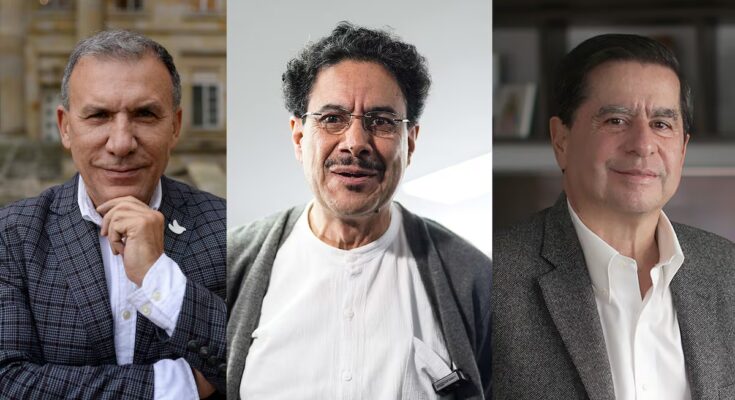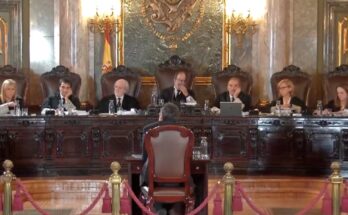The arrival of new competitors in the Colombian center-left reignites the long race to find a successor to President Gustavo Petro. Former Interior Minister Juan Fernando Cristo (Cúcuta, 61), of liberal origin, put an end to the suspense by confirming his candidacy for the presidency this week. His name joins the block of candidates in the orbit of the so-called Broad Front, a broad coalition still under construction. A few weeks ago, another longtime politician, former senator Roy Barreras (Cali, 61), made his campaign official. Both Cristo and Barreras have their own party and now aspire to compete with Senator Ivan Cepeda (Bogotá, 63 years old), the rival to beat, candidate of the left and leader of the polls after having authoritatively won the popular consultation of the Historical Pact with one and a half million votes. If successful, the Frente Amplio should result in a new – inter-party – consultation to choose a single candidate on the same day as the legislative elections, 8 March.
“The first thing to define is how broad the front is,” Cristo warned on Wednesday at the official launch of his aspiration, in a hotel in northern Bogota, stressing that he is keeping all possibilities open. “The Frente Amplio is an option, but there is still a long way to go in the conversations. We must also talk with the people of the center, with the liberals,” he said, recalling that he considers himself, fundamentally, a reformist liberal. Observers agree that the left needs more centrist voters if it wants to maintain power. Especially in view of a possible second round, for which Cepeda would benefit from softening his image.
Despite the obstacles and the legal uncertainty not yet resolved, the great alliance to bring together the left and other more centrist and liberal political forces is beginning to take shape. The dialogues are intense, delicate, but discreet. “We have had conversations with different political sectors on the guarantees for participation in the Broad Front, that everything is very clear and there is a programmatic discussion which is important”, explains Senator María José Pizarro, head of the Cepeda debate, by phone. Conversations are currently focused on these two points. “We had traced a democratic path. First of all we had to be able to organize the internal forces, choose a single candidate, present closed lists to Congress… We have already managed to consolidate the unity of the progressive forces, this is a more open phase, in which we are in competition with the other political parties”, adds the deputy, one of the most prominent leaders of the Historical Pact.
In addition to having been a senator for four terms, Cristo had already held the political portfolio during the period of Juan Manuel Santos (2010-2018), before briefly accepting that position again with Petro. The Ministry of the Interior has promoted a shock plan to speed up the implementation of the peace agreement with the FARC, which is far behind in this government. He is also the author of the emblematic Victims and Land Restitution Law. In the 2022 election cycle, he was part of the centrist coalition that supported Sergio Fajardo’s candidacy, and the Constitutional Court just relaunched his En Marcha party.
“Colombian democracy, as happens in most democracies in the world, is going through moments of division and deep radicalization that require moderation, common sense and a real goal to achieve social consensus, which shows us that we are capable of carrying out the transformations that the country needs,” Cristo diagnosed on Wednesday. “We liberals must recognize that the first democratic left government in Colombia meant the normalization of our democracy,” he added, referring to the Petro administration, whose reformist and inclusive spirit he defended. However, he assessed that to resolve the deterioration of Colombians’ healthcare, overcome the fiscal crisis, promote territorial autonomy or preserve the fight against climate change, “a government that unites, not divides, is needed.”
Roy Barreras also gravitates around the Frente Amplio, who last weekend launched his “total security” policy in Cali, in an attempt to distance himself from the total peace of the Petro, which proposed to negotiate simultaneously with all the armed groups and did not produce great results. This is also one of Cepeda’s weaknesses, closely linked to this government’s peace policy.
Despite not having a history of militancy on the left, Roy – simply, as everyone knows him – has become one of Petro’s main squires since the campaign. A doctor by profession, he served in various parties. He supported the right-wing Álvaro Uribe (2002-2010) and then Santos (2010-2018). From the legislature he promoted peace negotiations with the extinct FARC guerrillas and joined the Havana negotiating team, an effort in which he agreed with both Cepeda and Cristo.
At the beginning of the four-year period he also presided over Congress as a senator of the varied government coalition. He was tasked with putting the presidential sash on the Petro on August 7, 2022, a function he unexpectedly delegated to María José Pizarro. Now it has its own party, La Fuerza de la Paz, born from the split of the Historical Pact. Barreras defines it as the only political force within the government coalition that is centre-liberal and not left-wing.
In those first months of his legislature, Barreras did not let himself be stopped by chemotherapies to treat the colon cancer that he considered finished. He was the glue behind a coalition that pushed forward an ambitious tax reform, but which was dismantled before the first year of government. The Council of State then annulled his election as senator for double militancy. Petro reappointed him as ambassador to the United Kingdom, a position from which he resigned in May to reveal his presidential aspirations.
Other candidates could land on the Frente Amplio, such as the former governor of Nariño Camilo Romero, the former senator Clara López or even the former chancellor Luis Gilberto Murillo, who for the moment intends to continue on his own until the end. Jorge Ivan Cuervo, professor and researcher at the Externado University of Colombia, highlights the crossroads that the candidate of the Historical Pact finds himself facing. “Cepeda does not need the consultation of the Frente Amplio at this moment,” he underlines, since the vote has given him legitimacy and his current position almost guarantees his presence on the ballot without subjecting himself to this new tax. “But he also cannot despise the forces that look at him, he cannot despise Roy, Cristo, Murillo, Romero or López, because in the end he will need them later”, he immediately clarifies: “He must be very careful.” Everything is happening so that, with or without consultation, the centre-left’s candidacy is very competitive, he concludes.
The consultation of the Historical Pact has given Cepeda strong legitimacy and it will be difficult for other candidates to compete with him, agrees Yann Basset, professor of Political Science at the University of Rosario. “It’s a strategic bet that can be double-edged,” since they are traveling companions of the left without being exactly left-wing, he explains. “The Broad Front is necessary in the sense that Cepeda must reach the center, but that does not necessarily mean that a consultation must be held during the campaign,” he stresses. For now, take shape with a clear favorite.



